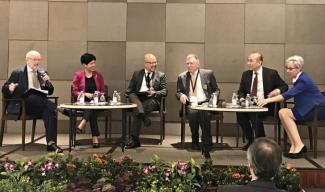
While tax systems must evolve to keep pace with the digital economy, maintaining a resilient tax base also involves ensuring that no company or individual is left behind, say panellists at the SMU-Tax Academy Centre for Excellence in Taxation’s conference.
Above (from left): Prof Jeffrey Owens, chairman of the centre’s technical advisory panel; Ms Indranee Rajah, Singapore’s Senior Minister of State for Law and Finance; Mr Chris Woo of PwC Singapore; Prof David Rosenbloom, member of the advisory panel; Mr Ho Khoon Ming of KPMG China; Prof Katarina Adam of HTW Berlin.
By Sim Shuzhen
SMU Office of Research & Tech Transfer – On top of death and taxes, there is perhaps a third certainty in life: the relentless march of technology.
Taxpayers, tax advisors and tax authorities may not always see eye to eye, but there is one thing they can agree on: The current tax system – designed for an era of trade in physical goods – needs to evolve to keep pace with the rise of digital technology and the new business models it has enabled.
“Digitalisation is now challenging conventional notions of taxation. Jurisdictions across the world, including Singapore, are grappling with how to deal with taxation of the digital economy and are studying this closely,” said Ms Indranee Rajah, Singapore’s Senior Minister of State for Law and Finance.
Ms Rajah was speaking on 17 August 2017 at ‘The Future of Taxes in Disruptive Times’, a conference organised by the Singapore Management University-Tax Academy Centre for Excellence in Taxation (SMU-TA CET), at which she was the guest of honour.
In addition to talks from tax experts, the conference also featured two panel discussions focusing on technological, economic and political shifts and their impact on taxation.
Dealing with disruption
“How can we design tax systems that encourage new technologies, and how can we adopt some of these technologies to transform our tax administrations? We need to adapt our tax systems for digital disruption and new forms of businesses, because that is where growth is going to come from,” said Professor Jeffrey Owens, chairman of the SMU-TA CET Technical Advisory Panel, who moderated the first panel on ‘Disruptive Trends in Taxation’.
Consider blockchain technology, for example. The distributed ledger system that underpins Bitcoin and other cryptocurrencies is theoretically tamper-proof and allows for the secure recording, sharing and verification of financial transactions.
For the tax world, this means improved transparency, security and fraud detection, as well as the ability to automate some of the manual processes associated with transfer pricing and transactional taxes. But it also means some degree of job loss for the tax industry.
“The environment is changing, and certain jobs are at risk. A key part of our roles as advisors and intermediaries is to collate information, digest it and present it to the authorities,” said panellist Mr Chris Woo, head of tax at PriceWaterhouseCoopers Singapore. “These roles will have to evolve or be revolutionised for the digital economy.”
Tax intermediaries will still play important roles in the future, but they will have to constantly update their knowledge and skills, said Professor Katarina Adam of HTW Berlin, another member of the panel. “Do not fear new technology. It can lead to a lot of opportunities, but you need to develop your skills and understand what it has to offer,” she told the audience.
In addition to digitalisation, the Organisation for Economic Co-operation and Development’s (OECD) Base Erosion and Profit Shifting (BEPS) project, which aims to reduce tax evasion by standardising international tax rules and improving disclosure around cross-border transactions, will also have a major impact on taxation and economic policy, agreed the panel.
A side effect of BEPS is that it will promote “fierce but fair” international competition for talent and businesses, said Professor Owens.
Singapore is working to offer businesses a skilled talent pool, robust infrastructure, good governance, and digital platforms that allow for connectivity to the region, said Ms Rajah, who also spoke on the panel. “We need to build up a value proposition that gives businesses a reason to be here,” she said.
“If [competition] is based purely on corporate tax rates, then we will find ourselves in a race to the bottom,” said Ms Rajah. “Instead, we have to ask ourselves what would make businesses come here even if our tax rate is not exactly the lowest.”
Tax in the real world
The conference’s second panel discussion, entitled ‘The Tax World By 2020’, considered what the near future holds for companies, governments and societies in terms of tax policy.
BEPS will certainly affect multinational corporations (MNCs), which will need to invest more effort into staying on top of their global tax positions, rather than simply focusing on their home offices, said panellist Mr Jonathan Stuart-Smith, partner (international tax services) at Ernst & Young.
“Tax departments need to change their outlook from being reactive to being much more proactive,” he said. This will help them anticipate and make decisions on potential tax disputes, which are expected to become more common with increased transparency and better cooperation among tax authorities, he added.
“All this requires a fundamental shift in the thinking of tax departments,” he added. “It probably also requires us to try and elevate the debate up to the C-suite, to make our executives aware that tax is now becoming a much more difficult issue to handle.”
Panel member Ms Doreen Tan, Chief Tax Policy Officer at Singapore’s Ministry of Finance, said that technological disruption will have broader implications for all sectors of society, including smaller businesses and lower-income earners.
The government is thus using various policy tools, including tax policy, to create a dynamic society where businesses and individuals can continue to work and upgrade their skills amidst technological change. "Only when our society is strong and our economy is strong can we have a strong tax system," said Ms Tan.
Back to Research@SMU Events Feature Series
Image credit: Ministry of Finance Singapore